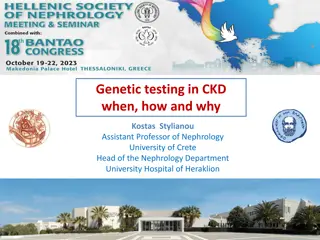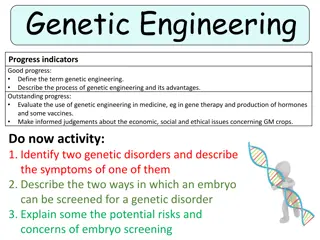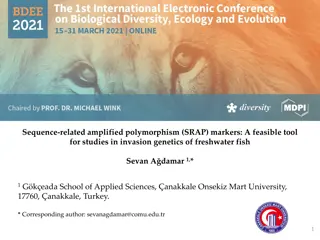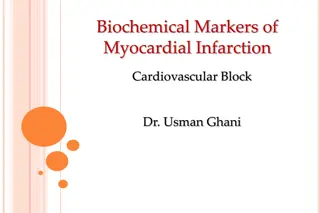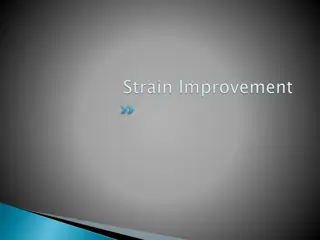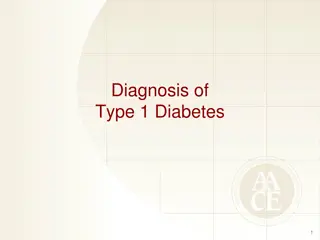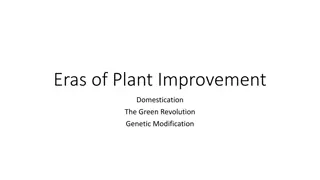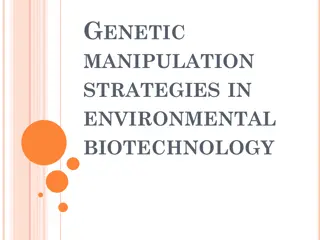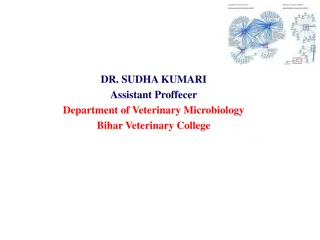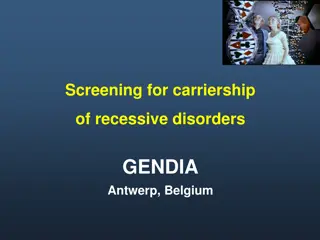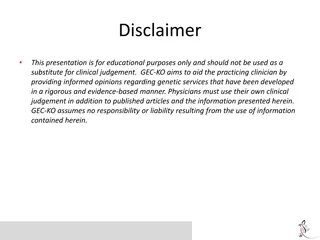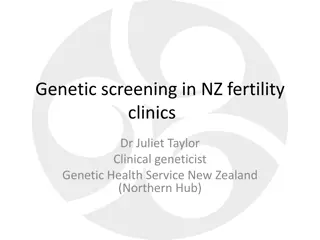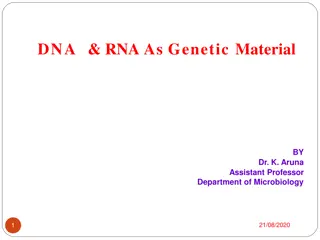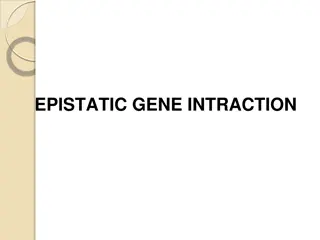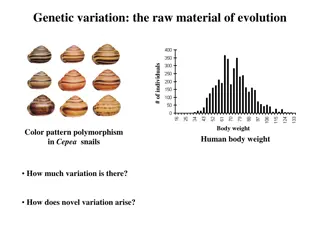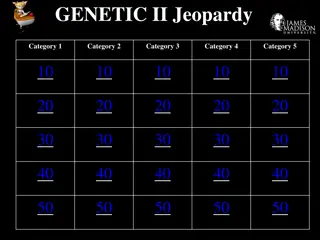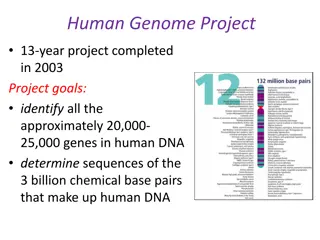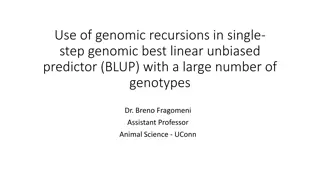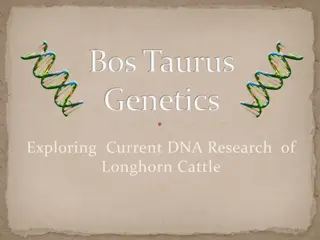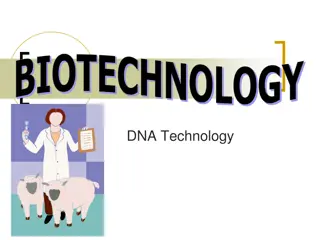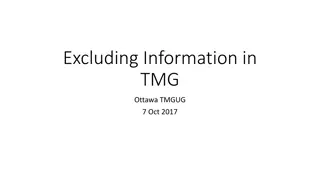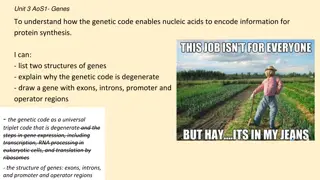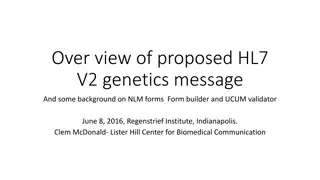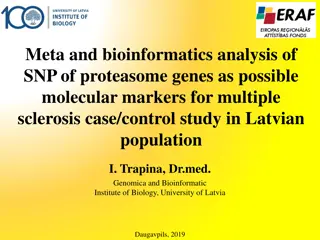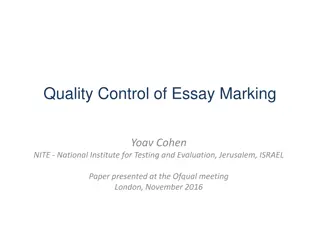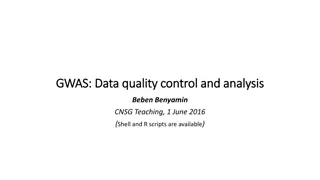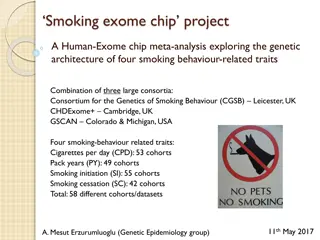Genetic Testing in Chronic Kidney Disease (CKD): Insights and Applications
Genetic testing plays a crucial role in identifying inherited kidney diseases, with around 15% of CKD cases having monogenic causes. Despite a high percentage of patients reporting a family history of CKD, Mendelian causes only account for about 10% of adult ESRD cases. Understanding the genetic bas
1 views • 52 slides
Overview of Human Genetic Disorders
Human genetic disorders encompass a range of conditions, from recessive disorders like cystic fibrosis to dominant disorders such as Huntington's disease. Examples include cystic fibrosis, Huntington's disease, and sickle-cell anemia. Understanding genetic disorders involves research and awareness o
0 views • 10 slides
Genetic Transformation: Introduction and Pre-Lab Inquiry
Explore the process of genetic transformation in the laboratory setting, focusing on inserting genes of interest into bacterial cells through recombinant DNA technology. Understand the role of restriction enzymes, plasmids, and genetic markers in this procedure. Engage in a pre-lab inquiry to identi
0 views • 14 slides
Exploring Genetic Engineering: From Basics to Applications
Genetic engineering involves altering the genetic material of organisms to achieve desirable traits. This process entails cutting out specific genes from one organism and transferring them to another. In medicine, genetic engineering finds applications in gene therapy, hormone production, and vaccin
0 views • 12 slides
SRAP Markers: Feasible Tool for Invasion Genetics of Freshwater Fish
Molecular tools, like Sequence-Related Amplified Polymorphism (SRAP) markers, play a crucial role in studying invasion genetics of freshwater fish. SRAPs offer a reliable and efficient way to assess genetic diversity and variations in non-native species, aiding in population genetics studies of inva
1 views • 5 slides
Understanding Genetic Markers in Molecular Mapping
Genetic markers play a crucial role in gene mapping within molecular biotechnology. They are fragments of DNA associated with specific genomic locations, aiding in identifying DNA sequences and analyzing genetic variation. Various types of genetic markers such as RFLP, SSR, and SNP offer insights in
1 views • 26 slides
Understanding Genetics: Mutations, Chromosomal Aberrations, and Genetic Engineering
Genetic mutations can be harmless, harmful, or beneficial, leading to variations within a species. Examples of gene mutations and chromosomal aberrations, like Trisomy 21, illustrate genetic abnormalities. The increase in Down Syndrome cases with maternal age highlights a maternal age effect. Geneti
0 views • 17 slides
Understanding Biochemical Markers of Myocardial Infarction
This lecture covers the criteria for diagnosing myocardial infarction (MI), features of ideal MI markers, the significance of plasma marker changes, and properties of markers such as cardiac troponins, creatine kinase, and myoglobin. It also discusses the new markers used for diagnosing MI and provi
1 views • 29 slides
Exploring Genetic Engineering: A Journey into Manipulating Organisms
Delve into the world of genetic engineering, where organisms' genetic makeup is altered for various purposes. Discover the process of modification, the history of genetic manipulation, and the impact of genetically modified organisms on society and science.
0 views • 20 slides
Improving Microbial Productivity and Characteristics for Industrial Applications
Efforts to enhance the productivity of natural isolates for commercial products involve genetic modifications through mutation, genetic recombination, and genetic engineering techniques. Desired characteristics include genetic stability, efficient production, versatility in carbon sources, and ease
1 views • 25 slides
Classification and Genetic Defects of Diabetes
The diagnosis and differential diagnosis of Type 1 and Type 2 diabetes are discussed, detailing the clinical courses, age of onset, body weight characteristics, onset patterns, and genetic factors. The etiologic classification of diabetes including insulin-deficient, immune-mediated, monogenic, and
0 views • 16 slides
Evolution of Plant Improvement: Domestication to Genetic Modification
Plant improvement has evolved through different eras - from ancient domestication to the Green Revolution and genetic modification. Domestication shaped major crops over millennia, the Green Revolution introduced high-yielding varieties, and genetic modification allows direct genetic alterations for
0 views • 6 slides
Genetic Manipulation in Environmental Biotechnology
Genetic manipulation strategies in environmental biotechnology involve techniques like gene splicing and molecular cloning to modify genes directly. These methods have various applications such as isolating genes, producing specific molecules, improving biochemical production, creating organisms wit
0 views • 20 slides
Understanding Bacterial Transformation in Molecular Biology
Transformation in molecular biology is a process where genetic material is altered by the uptake of exogenous DNA. It involves the direct incorporation of genetic material into a cell, leading to genetic changes. This phenomenon was first demonstrated by Frederick Griffith in 1928. The process of tr
1 views • 25 slides
Understanding Genetic Counselors and the NSGC
Genetic counselors play vital roles in healthcare by assisting patients with genetic conditions, advocating for their needs, educating providers, conducting research, and influencing public policy. The National Society of Genetic Counselors (NSGC) supports genetic counselors in their professional en
3 views • 12 slides
Genetic Carrier Screening for Recessive Disorders by GENDIA, Antwerp, Belgium
Explore the world of genetic carrier screening offered by GENDIA in Antwerp, Belgium. Learn about prenatal screening for various genetic disorders, including Down syndrome and severe monogenic disorders. Discover the frequency of common recessive disorders and the severity of genetic diseases. Uncov
0 views • 17 slides
Exploring Expanded Carrier Screening in Family Planning
Learn about expanded carrier screening as a tool for identifying genetic risks in family planning scenarios. Understand the importance of genetic testing, considerations for non-consanguineous couples like Julie and Chris, and the evolving landscape of genetic services. Explore key aspects such as f
1 views • 36 slides
Genetic Screening and Reproductive Carrier Testing in New Zealand Fertility Clinics
Genetic screening and reproductive carrier testing play crucial roles in identifying and managing genetic disorders in couples planning for pregnancy. While carrier screening is recommended for all couples, it is not widely followed in New Zealand. Pre-conceptual reproductive carrier screening is no
0 views • 19 slides
Understanding Direct-to-Consumer Genetic Testing: Cases and Considerations
Explore real-life scenarios of individuals opting for Direct-to-Consumer Genetic Testing (DTC-GT) to assess genetic risk for various health conditions. Consider the implications, limitations, and cautions associated with DTC-GT, highlighting the importance of comprehensive evaluation and genetic cou
0 views • 39 slides
Understanding Genetic Disorders and Their Impact on Health
Genetic disorders are caused by abnormalities in genes or chromosomes, leading to various health conditions. Inherited disorders can be passed down from parents to children, affecting physical makeup and processes in the body. In India, there is a high prevalence of genetic disorders, particularly i
1 views • 12 slides
Understanding DNA and RNA as Genetic Material
Genetic material plays a crucial role in the transmission of traits from one generation to the next. This article explores the significance of DNA and RNA as genetic material, highlighting key experiments and discoveries that demonstrate DNA's role in carrying hereditary information. From Mendel's h
0 views • 32 slides
Understanding the Key Articles of the Nagoya Protocol on Access to Genetic Resources and Benefit-Sharing
The Nagoya Protocol aims to promote fair sharing of benefits from genetic resources utilization for conservation efforts. It encompasses access, technology transfer, funding, and respect for rights over resources and technologies. The protocol applies to genetic resources, traditional knowledge, and
1 views • 19 slides
Understanding Epistasis: Genetic Interactions and Their Implications
Epistasis is a phenomenon where the phenotypic expression of one gene is influenced by interactions with another gene. This concept, first introduced in 1909, plays a crucial role in genetics, affecting various traits and evolutionary processes. The difference between dominance and epistasis lies in
0 views • 41 slides
Understanding Genetic Variation and Its Role in Evolution
Genetic variation is crucial for evolution, providing the raw material for adaptation and species diversity. Phenotypic variation can arise from differences in genotype, environment, or their interaction. Studying genetic variation through statistical analysis and at the molecular level helps us unr
0 views • 47 slides
Project on Market-Class Specific Markers in Beans
This project, funded by the USDA National Institute of Food and Agriculture, focuses on identifying market-class specific markers in various types of beans. Through the use of polymorphic SNPs and indel markers, the project aims to enhance understanding of genetic variations in different bean variet
0 views • 17 slides
Using Ensembl SNP Data to Generate KASP Markers with PolyMarker
Welcome to PolyMarker! This tool allows you to design your own primers or download pre-designed primers for SNP data from Ensembl. You can create KASP markers by uploading your .csv file containing SNP information, aligning parental sequences, and analyzing SNP markers found using Biomart. Understan
0 views • 13 slides
Genetics II Jeopardy: Linked Genes, Genetic Mapping, and Sex Chromosomes
Explore the world of genetics with Genetics II Jeopardy, covering topics such as linked genes, genetic mapping, sex chromosomes, and inheritance patterns. Discover the significance of gene location on chromosomes, the concept of recombination frequency, and the role of specific genes like SRY in mal
0 views • 26 slides
Evolutionary Computation and Genetic Algorithms Overview
Explore the world of evolutionary computation and genetic algorithms through a presentation outlining the concepts of genetic algorithms, parallel genetic algorithms, genetic programming, evolution strategies, classifier systems, and evolution programming. Delve into scenarios in the forest where gi
0 views • 51 slides
Understanding Genetic Disorders and the Human Genome Project
The Human Genome Project, completed in 2003, aimed to identify all human genes and DNA sequences. Genetic disorders, like autosomal disorders and Huntington's disease, can result from mutations at different levels, affecting single genes, chromosomes, or multiple genes. Albinism and cystic fibrosis
0 views • 37 slides
Genomic Recursions in Genomic BLUP for Animal Breeding
Explore the application of genomic recursions in single-step genomic best linear unbiased predictor (BLUP) for genetic evaluations in animal breeding. Understand the significance of using genomic data to improve genetic selection, increase accuracy, shorten generation intervals, and enhance genetic
0 views • 31 slides
Exploring Longhorn Cattle Genetics Through DNA Research
Longhorn cattle genetics are being investigated through DNA research to identify unique traits and differentiate them from other cattle breeds. By analyzing genetic codes with scatter plot graphs, scientists aim to map the genetic makeup of Longhorns accurately. This research helps in understanding
0 views • 9 slides
Understanding Genetic Engineering and Genetic Variation
Genetic engineering plays a crucial role in manipulating genes to produce desired traits in organisms. Concepts like the origin of genetics, laws of segregation and independent assortment, and nucleic acid structure are fundamental in this field. Understanding the difference between the nuclei of eg
0 views • 50 slides
Understanding Biotechnology: From Ancient Techniques to Modern Genetic Engineering
Biotechnology is the study of utilizing tools from living organisms to develop new products and processes for the benefit of society. It encompasses ancient practices like fermentation to modern genetic engineering techniques, such as manipulating genetic information in organisms. The Human Genome P
0 views • 31 slides
Managing Display of Information in TMG
Learn how to control the display of information in TMG software by using exclusion markers. Exclusion markers help you suppress certain fields in order to make space for other important information to be viewed, control export to GEDCOM files, and manage printing preferences. These markers can be ap
0 views • 20 slides
Understanding Genes and the Genetic Code for Protein Synthesis
Explore the structures of genes, the degeneracy of the genetic code, and the process of protein synthesis through transcription, RNA processing, and translation. Delve into the role of exons, introns, promoters, and operators in gene expression in eukaryotic cells. Learn why the genetic code is dege
0 views • 13 slides
Overview of HL7 V2 Genetics Messaging and LOINC Genetic Testing Codes
This content delves into the proposed HL7 V2 genetics message, NLM forms builder, UCUM validator, and the current state of genetic testing codes in LOINC. It discusses the types of molecular genetic tests present in LOINC and the evolution towards newer genetic tests. The content also covers how LOI
0 views • 21 slides
Analysis of Proteasome Gene SNPs as Molecular Markers for Multiple Sclerosis in Latvian Population
This study by I. Trapina aims to investigate the prevalence and functionality of SNPs in proteasome genes to assess their potential as molecular markers for multiple sclerosis in the Latvian population. Multiple sclerosis is an autoimmune disease affecting the central nervous system, and the role of
0 views • 13 slides
Ensuring Quality in Essay Marking Process: Practical Strategies
Ensuring quality in the essay marking process involves various factors such as proactive quality assurance, training markers effectively, managing underperforming markers, and addressing bias and reliability issues. Strategies include deciding markers and items per paper, choosing horizontal or vert
0 views • 57 slides
Understanding GWAS: A Brief Overview of Genetic Association Studies
GWAS, or Genome-Wide Association Studies, are a method used to map genes associated with traits or diseases by analyzing genetic markers throughout the genome. This process involves statistically testing the association between SNPs and traits using regression or chi-squared tests in a hypothesis-fr
0 views • 19 slides
Genetic Architecture of Smoking Behavior Traits: Meta-Analysis Insights
Exploring the genetic basis of smoking behavior-related traits through a meta-analysis combining data from three large consortia across 58 different cohorts/datasets. The study investigates genetic variants associated with cigarettes per day, pack years, smoking initiation, and smoking cessation. Ov
0 views • 34 slides
